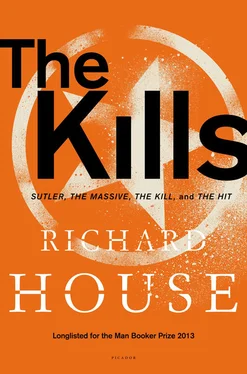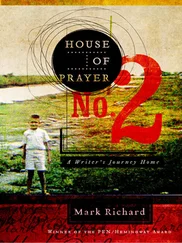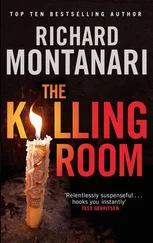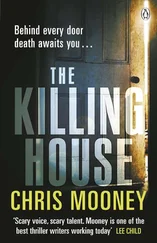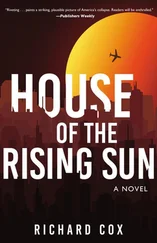He couldn’t guess how far he’d fallen. Thirty feet? Thirty-five? How high was the promontory? One hundred and twenty? A possible further ninety feet below him.
Suspended by pressure on his chest and hips, pinched between the rock, breathing became hard, a conscious effort, and he found it difficult to draw a deep enough breath to shout.
Eric pressed his fingers one by one to the rock, a thought to each digit.
1. prioritize to save energy
2. assess damage
3. relieve weight and pressure on chest
4. do not panic
5. in ten days you will be in Malta — OK, depending on new tickets, a new passport
6. use the force exerted by the rock as a lever — or, maybe not
7. don’t think of large gestures, big motions, but incremental improvements
He could see daylight, sky, a wide stripe of gorgeous blue, almost mauve, intense and unspoiled.
8. get laid as soon as you get out of this. Stop sabotaging every opportunity.
His first seizure came as specks fizzing in a bright sky, and the realization that this didn’t look too good. In the strangeness of what followed, as his head hammered from side to side, hard and distinct images came to him: him locked, lying on a floor with Tom on top of him, the pressure of another body, and while he shook between the walls he felt the real heat of being held, of strong arms, and a conviction informed by smell, heat, touch that this was Tom.
And 9. What was it? Some question he had to answer yes or no.
3.14
Ford returned through the market. Outside the barber shop he slowed to a walk and patted his pockets. No cigarettes. He bought a pack and returned to the terminal admitting to himself that he hadn’t liked Eric. It wasn’t indifference he felt now but active dislike. The boy bothered him, watched him all the time; examined and tested him with all of his questions, and it was good to admit to this dislike. He considered for a moment leaving things as they were. He would be long gone before they could slot anything comprehensible together. But he couldn’t be sure. One word might be enough. One accident. One connection.
After handing over his backpack to the kiosk ready for departure, he sat and faced the square. A single track led up to the fort — he couldn’t see anywhere for Eric to hide. The market stalls opened out one to another. However busy, it would be impossible for Eric to pass unnoticed, unless, somehow, he’d doubled back immediately, heading for the hotel and not the fort — although this didn’t seem likely.
With no other open option Ford decided to return to the Maison du Rève. If he found Eric he would reason with him, draw these ideas out of his head and persuade him that he was wrong. I’m not who you think I am. How ridiculous do you think this sounds? If Eric had figured out his identity it could not have come from anything he had said. His silence might have spiked the boy’s curiosity, this was true, but he had given none of them any detail about himself or his life to fuel this realization. He could fix this.
Ford returned to the pension. He turned gingerly into the street. To his relief both the car and the man were gone.
Mehmet allowed Ford into the courtyard. He hadn’t seen Martin and Nathalie all afternoon and thought that they were out; he was just leaving himself, but it was no problem if Ford wanted to wait. With the door open to his room Ford was surprised to see his bed already stripped, the sheets and blanket stacked at the end of the bed, military style. The print of the French mountains tilted on the wall. Eric’s rucksack lay at the end of the cot, zips open, clothes draped along the towel rail to dry.
He closed the door and made sure it was secure before he searched a second time through Eric’s backpack. Among the twists of rope, the steel crampons, he found three identical black notebooks, his toothbrush and razor. Folded in a washcloth in a side pocket he discovered a fat roll of money. The money confused him. He’d found traveller’s cheques before, but here was cash. He counted out two thousand American dollars, two thousand exactly. He flicked through the corners of damp twenty-dollar bills, counting up; puzzled that anyone would carry so much money and leave it unsecured. In a washbag he found the traveller’s cheques and two more notebooks. For good measure he checked again through the boy’s book and found nothing but the newspaper clippings.
He held the book by its spine and scattered the papers free about the bed. He double-checked that the door was secure then returned to the cot. The clippings were folded tidily into small square chits. The articles concerned the novel. Some covered details about the writer’s disappearance, some debated issues surrounding what looked to be a murder, although no body was found. Ford skimmed through details: the discovery of body parts (a shopping bag with a severed tongue), a bloody room, clothes cut and dumped on wasteland, a photograph of a mariner’s star, and he quickly became confused — were they talking about the plot of the novel or an actual murder? One clipping, an interview with the writer, was annotated and underlined. On the reverse — to his alarm — he discovered a photograph of himself standing beside Paul Howell.
So this is how he knew.
How strange to recognize himself. Strange also to remember the airfield, the aircraft, the delivery of pallets of money packed into thick bricks loaded into orderly stacks — he’d seen this one time, accompanied Howell on Howell’s command, and had no idea that they were being photographed. The loading bay stopped with tens of millions of dollars. Howell presented himself with a tight oafish smile, perhaps even a little smug: the man appeared duplicitous even when he was sincere. The photograph wasn’t clear. Ford stood in shadow, obscured. The accompanying article gave details of Howell’s arrest, the embezzlement of reconstruction funds, and the disappearance of the event’s main player — Stephen Lawrence Sutler. Teams of investigators were searching for him in Jordan, Syria, Kuwait, Turkey.
Here was the spark he most feared. Ford’s hand began to shake. What he read did not make sense. He flattened the paper onto the cot and re-read the article, this time shaking his head with complete incredulity, stunned to see the name Stephen Lawrence Sutler in print, astounded by the charge of theft. Fifty-three, he read again, fifty-three million dollars of misappropriated funds.
The figure left him giddy. Fifty-three million. A mistake, a gross miscalculation. Two hundred and fifty thousand was all that Howell had transferred, money he’d yet to claim from the junk account. Fifty-three million? The figure hollowed him out.
I know who you are.
He shoved the clipping into his pocket then began to re-fold the cuttings, a sense of endlessness coming to him, a panic at having to fold each piece of paper two or three times, the minute nature of this action running contrary to the scale of the theft. Fifty-three million. Ford scooped up the clippings, cash, and traveller’s cheques: details of the article repeated as noise in his head. Teams of investigators. Deputy Administrator Paul Howell arrested. Fifty-three million unaccounted. He stuffed the papers between the pages of the book, but couldn’t see the point of it. I know who you are. Taking one article would change nothing. Down to his last fifty dollars, his options were more limited than he’d imagined.
Now sweating he knew that however calm he appeared his agitation would be apparent. He would give himself away. With Eric’s belongings back in place he looked down at the bed. The money. What was he doing? He needed money, and here was money. Here was money and traveller’s cheques. Four thousand dollars. Enough to see him clear to Europe. He could head directly to Istanbul as planned, check into a hotel, use his final opportunity to transfer the money from the junk account to wherever he wanted.
Читать дальше
